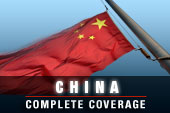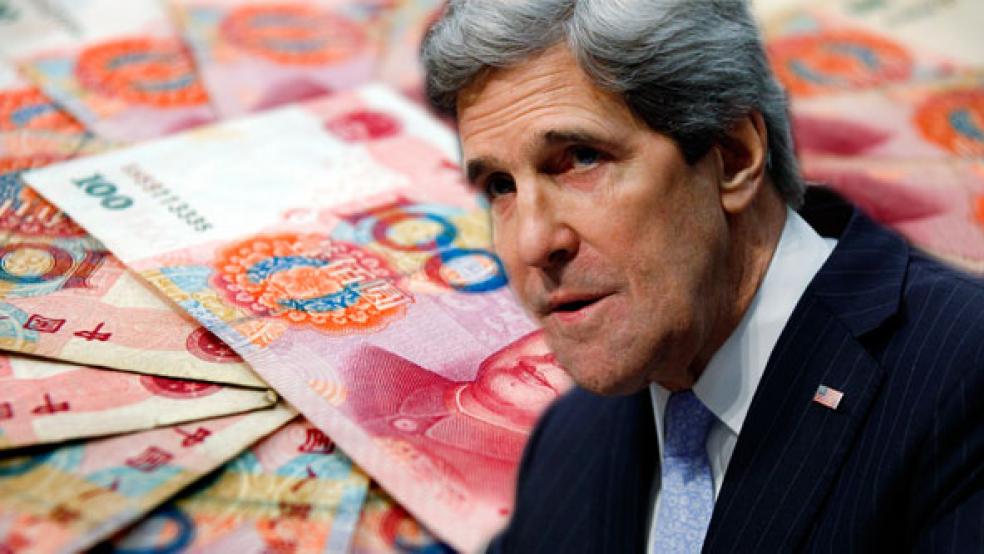John Kerry is one step closer to becoming secretary of State and managing the United States’ economic ‘frenemy’—China.

The Senate Foreign Relations Committee unanimously approved Kerry’s nomination on Tuesday, which puts his candidacy before the entire chamber. Getting approval wasn’t much of a heavy lift for Kerry, who has represented Massachusetts in the Senate since 1985 and just so happens to be chairman of the Foreign Relations Committee.
“More than ever, foreign policy is economic policy,” Kerry told the committee. The Democrat added that his goal—and presumably that of his future boss President Obama—was to strengthen the relationship with China, even if that means some occasional bits of friction.
"China is, you know, the other sort of significant economy in the world and obviously has a voracious appetite for resources around the world, and we need to establish rules of the road that work for everybody," Kerry said.
The U.S. has a unique dependency on China and vice-versa. For the first 11 months of last year, China exported $390 billion worth of clothing, electronics, and other services to the United States. We’re the customer that fuels their growth and their appetite for natural resources such as rare earth metals, coal, and oil.
But China also controls $1.15 trillion in U.S. government debt. That’s a smidge under 10 percent of all publicly held debt—most of which is still owned by Americans. However, the Chinese government is able to exercise economic muscles in ways that individual American consumers cannot.
There are also charges by the Obama administration that China violated trade pacts on auto parts and other goods. Not to mention the perennial questions of currency manipulation, environmental destruction, and copyright piracy.
In other words, a lot of businesses will depend on how Kerry pursues this relationship. Here will be the first few challenges that he tackles with the world’s second biggest economy:
Are we headed into a trade war? The anxieties are definitely rising after the last year, when Obama took on China for dumping solar panels on our shore and the presidential election was filled with heated rhetoric about American jobs being stolen.
American carmakers are already part of the collateral damage.
“The U.S. has launched investigations, continued existing duties, and filed complaints at the World Trade Organization, on a number of other Chinese products as well over the past year,” the DC-based lobbying shop ML Strategies wrote in its 2013 outlook. “In response, China has taken similar actions on American products, most notably certain automobiles imported from the U.S. The coming year will likely see a continuation of trade tensions between the U.S. and China.”
Will there be a battle over island territory? The World Economic Forum—the Swiss nonprofit that sponsors “Davos”—warns that China and Japan could be headed for a naval confrontation over the Senkaku/Diaoyu islands.
Never heard of these five islands and three rocks in the Pacific Ocean? It’s a major headache for Kerry.He might have to defuse the nationalist tensions of both countries, spending diplomatic capital on security issues instead of economic ones. After all, the United States briefly had control of these islands after World War II and gave them to the Japanese in 1972—the same year China and Taiwan claimed ownership.
Will the wall come down on transparency? China has also been hounded by their leaders enriching themselves on the public’s dime, or in this instance, yuan. Prime Minister Wen Jiabao’s family accumulated a $2.7 billion fortune, The New York Times reported. The wife of another politburo member (who was enriched by his office) was convicted of murdering a British national. This could cause the Chinese elite to search for scapegoats, instead of enacting reforms favored by the United States that would produce more of the openness and transparency.
“The leadership may focus on quelling transparency into its dealings at the expense of enacting much-needed governance or reform,” the World Economic Forum’s Global Agenda Council concluded in a report published last week. “External enemies are blown up, potential opponents are crushed and sabres are rattled.”
But at least one group other than the U.S. Senate is relieved that Kerry is poised to become the top diplomat—the Chinese. The state-sanctioned China Daily quoted think tank experts in December who described Kerry as “professional, calm and pragmatic.”
Ruan Zongze, a former senior Chinese diplomat in the U.S. and the deputy director of the China Institute of International Studies, told the newspaper that Kerry would need to repair the damage of the past few years.
“China-U.S. ties have deteriorated through a series of high-profile measures by the U.S. aimed at rebalancing, especially the over-emphasis of military action, which triggered great antipathy from China,” Ruan said.




